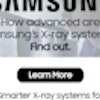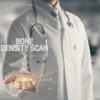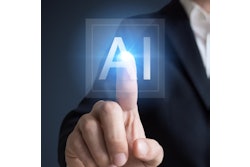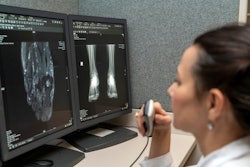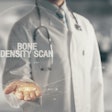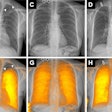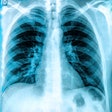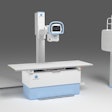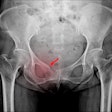CHICAGO -- A commercially available AI algorithm that can prioritize x-ray exams when it detects fractures yields “tremendous reductions” in report turnaround times, according to a study presented November 28 at RSNA.
Sean Raj, MD, discussed a pilot study led by outpatient radiology group SimonMed Imaging that evaluated Rayvolve by AZmed on turnaround time (TAT) for fracture detection. Based on the pilot study, the group plans to fully implement the software by the end of the year, Raj noted.
“We can definitely say that Rayvolve improves patient care and improved our turnaround time,” said Raj, of UT Southwestern Medical Center in Dallas, TX.
Raj and colleagues began evaluating AI vendors in 2022, and launched a pilot study to see “if this even works,” as claims by vendors don’t always meet expectations, he noted. Rayvolve is designed to help prioritize x-ray work lists by identifying exams positive for fractures, as well as localize the fractures within the x-rays.
The software was configured to push email notifications three times a day, at 8 a.m., noon, and 3 p.m., with the AI software indicating no suspicion, low suspicion, or suspicion of fracture with boundary boxes indicating the suspected area. The AI images were displayed next to the original image for review by the radiology readers. All x-rays were evaluated except those for pediatric patients, facial fractures, rib fractures, and spine fractures, Raj noted.
For the study, the researchers included 50,682 exams and divided them into a one-month “pre-AI period” (n = 23,088) and a one-month “post-AI period” (n = 27,594). PACS data were used to determine turnaround times (the time from examination completion to report availability) and for the analysis, times for reports positive for fracture, using final radiology reports as reference, were compared between the pre-AI and post-AI periods.
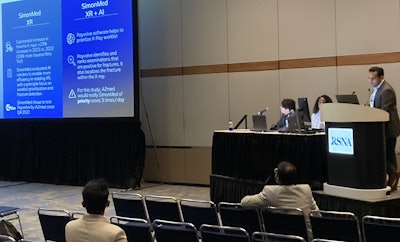 Sean Raj, MD, of UT Southwestern Medical Center, presented a pilot study of an AI algorithm for fracture detection on November 28 at RSNA in Chicago.Will Morton
Sean Raj, MD, of UT Southwestern Medical Center, presented a pilot study of an AI algorithm for fracture detection on November 28 at RSNA in Chicago.Will Morton
According to the findings, the frequency of acute fracture, based on radiology reports, was 10.6% during pre-AI period and 11.5% during post-AI period. This indicated that the algorithm may have actually helped identify more acute fractures, Raj noted.
For fracture-positive examinations, the mean report turnaround time during the pre-AI period was 47.5 hours and during the post-AI period, the mean turnaround time was 8.5 hours, a significant mean difference of 39 hours, Raj said.
“AI-driven reprioritization yielded tremendous reductions in report turnaround time for fracture-positive x-ray exams,” Raj said.
Based on the study, Raj said the group has received a “green light” to fully implement the software, which they plan to do by the end of the year. Moreover, Rayvolve is one of between 40 and 50 algorithms that include other applications than fracture detection that they have similarly evaluated.
“We’re going all in on AI,” Raj said.


